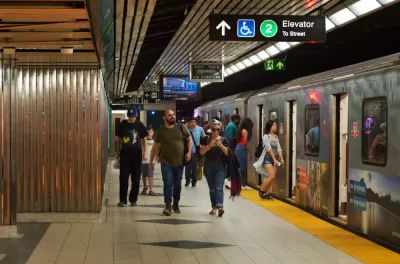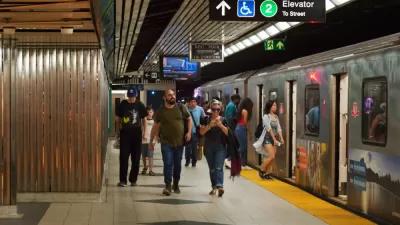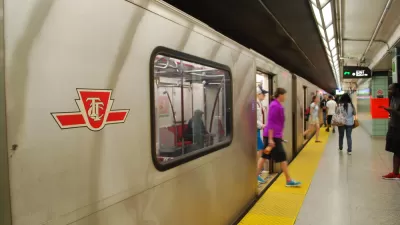A key piece of the funding required to achieve Ontario Premier Doug Ford's vision for an expanded subway system in Greater Toronto Area clicked into place this week.

The Canadian government has promised to spend more than $12 billion to help fund the public transit plans spearheaded by Ontario Premier Doug Ford for the Greater Toronto Area (GTA), reports Ben Spurr.
The controversial "New Subway Transit Plan for the GTA" has been expedited through the planning process after the province, led by Premier Ford, took over subway planning from the city of Toronto.
"The plan consists of the Ontario Line, Eglinton Crosstown West LRT, and the Scarborough and Yonge North subway extensions," explains Spurr. "Together the four projects are expected to cost $26.8 billion to build, plus $1.7 billion for design and planning. The federal government has agreed to contribute up to $10.7 billion for construction, while the province has committed $17 billion."
The article includes more context about the political conflicts created by Ontario's ongoing struggles with COVID-19 infections, as well as the politics of transit planning during the Ford administration. Spurr provides this summary of the criticisms of the provincial subway plan:
Some elements of the province’s transit plan have been criticized as expensive overbuilds. Ford’s government intends to spend $1.8 billion extra to build the Eglinton West LRT underground despite there being ample room to construct it at the surface, while the $5.5-billion three-stop Scarborough subway extension will take so long to complete residents will be stuck riding buses for at least seven years before it’s done.
FULL STORY: Ottawa to kick in more than $10 billion to help fund Doug Ford’s Toronto transit plans

Maui's Vacation Rental Debate Turns Ugly
Verbal attacks, misinformation campaigns and fistfights plague a high-stakes debate to convert thousands of vacation rentals into long-term housing.

Planetizen Federal Action Tracker
A weekly monitor of how Trump’s orders and actions are impacting planners and planning in America.

Chicago’s Ghost Rails
Just beneath the surface of the modern city lie the remnants of its expansive early 20th-century streetcar system.

Bend, Oregon Zoning Reforms Prioritize Small-Scale Housing
The city altered its zoning code to allow multi-family housing and eliminated parking mandates citywide.

Amtrak Cutting Jobs, Funding to High-Speed Rail
The agency plans to cut 10 percent of its workforce and has confirmed it will not fund new high-speed rail projects.

LA Denies Basic Services to Unhoused Residents
The city has repeatedly failed to respond to requests for trash pickup at encampment sites, and eliminated a program that provided mobile showers and toilets.
Urban Design for Planners 1: Software Tools
This six-course series explores essential urban design concepts using open source software and equips planners with the tools they need to participate fully in the urban design process.
Planning for Universal Design
Learn the tools for implementing Universal Design in planning regulations.
planning NEXT
Appalachian Highlands Housing Partners
Mpact (founded as Rail~Volution)
City of Camden Redevelopment Agency
City of Astoria
City of Portland
City of Laramie




























